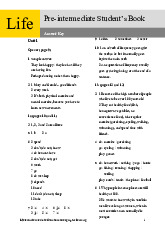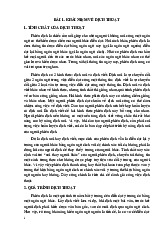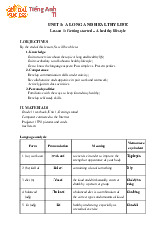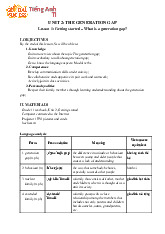









Preview text:
Phụ lục I
KHUNG KẾ HOẠCH DẠY HỌC MÔN HỌC CỦA TỔ CHUYÊN MÔN
(Kèm theo Công văn số 5512/BGDĐT-GDTrH ngày 18 tháng 12 năm 2020 của Bộ GDĐT)
TRƯỜNG: ..................................................................
CỘNG HÒA XÃ HỘI CHỦ NGHĨA VIỆT NAM
TỔ: ..............................................................................
Độc lập - Tự do - Hạnh phúc
KẾ HOẠCH DẠY HỌC CỦA TỔ CHUYÊN MÔN
MÔN HỌC/HOẠT ĐỘNG GIÁO DỤC .........................., KHỐI LỚP............
(Năm học 20..... - 20.....)
I. Đặc điểm tình hình
1. Số lớp: ..................; Số học sinh: ...................; Số học sinh học chuyên đề lựa chọn (nếu có): ……………
2. Tình hình đội ngũ: Số giáo viên: ...................; Trình độ đào tạo: Cao đẳng: ........ Đại học:...........; Trên đại học:.............
Mức đạt chuẩn nghề nghiệp giáo viên 1: Tốt:.............; Khá:................; Đạt:...............; Chưa đạt:........
3. Thiết bị dạy học: (Trình bày cụ thể các thiết bị dạy học có thể sử dụng để tổ chức dạy học môn học/hoạt động giáo dục) STT Thiết bị dạy học Số lượng
Các bài thí nghiệm/thực hành Ghi chú 1 2 3
1 Theo Thông tư số 20/2018/TT-BGDĐT ngày 22/8/2018 ban hành quy định chuẩn nghề nghiệp giáo viên cơ sở giáo dục phổ thông. … …
4. Phòng học bộ môn/phòng thí nghiệm/phòng đa năng/sân chơi, bãi tập (Trình bày cụ thể các phòng thí nghiệm/phòng
bộ môn/phòng đa năng/sân chơi/bãi tập có thể sử dụng để tổ chức dạy học môn học/hoạt động giáo dục) STT Tên phòng Số lượng
Phạm vi và nội dung sử dụng Ghi chú 1 2 ...
II. Kế hoạch dạy học2
1. Phân phối chương trình STT Bài học Số tiết Yêu cầu cần đạt (1) (2) (3) 1 UNIT 1 Getting started 1 tiết
By the end of this unit, students will be able to: Language 1 tiết
• identify and pronounce strong and weak forms of auxiliary verbs; Reading 1 tiết
• understand and use words and phrases related to health and fitness; Speaking 1 tiết
• use the past simple and the present perfect correctly; Listening 1 tiết
• read for main ideas and specific information in an article about Writing 1 tiết
living a long and healthy life; 1 tiết
• give instructions for an exercise routine; Communication
• listen for main ideas and specific information in a TV chat show and Culture/CLIL about food and health; Looking back & 1 tiết
• write a short message in response to an invitation; Project
• offer help and respond to offers;
• identify the main differences between bacteria and viruses;
• design a poster about a healthy habit and give a poster presentation
2 Đối với tổ ghép môn học: khung phân phối chương trình cho các môn about it. 2 UNIT 2 Getting started 1 tiết
By the end of this unit, students will be able to: Language 1 tiết
• identify and pronounce contracted forms correctly in sentences; Reading 1 tiết
• understand and use words and phrases related to generational Speaking 1 tiết differences; Listening 1 tiết
• use modal verbs: must, have to, and should;
• read for main ideas and specific information in an article about Writing 1 tiết 1 tiết different generations; Communication
• talk about the different generations of a family; start a and Culture/CLIL conversation and discussion; Looking back & 1 tiết
• listen for specific information in a conversation about family Project conflicts;
• write an opinion essay about limiting teenagers’ screen time;
• understand the generation gap in Asian American families;
• carry out a survey to find out generational differences in families
and give a group presentation about them. 3 UNIT 3 Getting started 1 tiết
By the end of this unit, students will be able to: Language 1 tiết
• link final consonants to initial vowels in sentences; Reading 1 tiết
• understand and use words and phrases related to cities and smart Speaking 1 tiết living; Listening 1 tiết
• use stative verbs in the continuous form, and linking verbs; • read for specific Writing 1 tiết
information in an article about the characteristics 1 tiết of future cities; Communication
• discuss cities of the future and keep a conversation going by and Culture/CLIL asking Wh-questions; Looking back & 1 tiết
• listen for main ideas and specific information in an interview Project
about the disadvantages of living in a smart city;
• write an article about the advantages and disadvantages of living in a smart city;
• express certainty and uncertainty;
• recognise features of smart cities around the world;
• design a poster about the ideal city of the future and give a poster presentation about it. 4 REVIEW 1 Language 1 tiết
Review 1 is aimed at revising the language and skills Ss have learnt Skills (1) 1 tiết
in Units 1-3. Introduce the review by asking Ss if they remember Skills (2) 1 tiết
what they have learnt so far in terms of language and skills.
Summarise Ss’ answers and add some more information if necessary. 5 MID-TERM TEST 1 tiết 6 UNIT 4 Getting started 1 tiết
By the end of this unit, students will be able to: Language 1 tiết
• identify and pronounce words with elision of vowels in isolation Reading 1 tiết and in sentences; Speaking 1 tiết
• understand and use words and phrases related to ASEAN; Listening 1 tiết
• use gerunds as subjects and objects;
• read for main ideas and specifіc information in news items about Writing 1 tiết 1 tiết ASEAN countries; Communication
• discuss the skills and experience needed for the ASEAN Youth and Culture/CLIL
Programme, and ask for and give opinions; Looking back & 1 tiết
• listen for main ideas and specifіc information in a conversation Project
about an ASEAN school tour programme;
• write a proposal for a welcome event;
• give compliments and respond;
• understand when and how people celebrate the New Year in ASEAN;
• do research about an ASEAN member and give a presentation about it. 7 UNIT 5 Getting started 1 tiết
By the end of this unit, students will be able to: Language 1 tiết
• use sentence stress appropriately to speak with a natural rhythm; Reading 1 tiết
• understand and use words and phrases related to global warming; Speaking 1 tiết
• use present participle and past participle clauses correctly; Listening 1 tiết
• read for main ideas and specific information in an article about the Writing 1 tiết UN Climate Change Conference; Communication 1 tiết
• talk about human activities and global warming, and present ideas and Culture/CLIL clearly in a discussion; Looking back & 1 tiết
• listen for main ideas and specific information in a talk about black Project
carbon and global temperature;
• write a leaflet to persuade people to reduce black carbon emissions;
• give warnings and respond;
• understand the environmental impact of farming and how to reduce it;
• carry out a survey to find out how local people try to limit global
warming and present the survey results to the class. 8 REVIEW 2 Language 1 tiết
Review 2 is aimed at revising the language and skills Ss have learnt Skills (1) 1 tiết
in Units 4 - 5. Introduce the review by asking Ss if they remember Skills (2) 1 tiết
what they have learnt so far in terms of language and skills.
Summarise Ss’ answers and add some more information if necessary. 9
REVISION Revision for end-of 1 tiết term test 10 END-TERM TEST 1 tiết 11 Feedback and correction 1 tiết 12 In reserve 1 tiết 13 UNIT 6 Getting started 1 tiết
By the end of this unit, students will be able to: Language 1 tiết
• use falling and level-rising intonation in statements, commands, Reading 1 tiết and lists; Speaking 1 tiết
• understand and use words and phrases related to preserving Listening 1 tiết heritage; Writing 1 tiết
• use to-infinitive clauses to express purpose and modify nouns or Communication 1 tiết noun phrases; and Culture/CLIL
• read for main ideas and specific information in an article about an Looking back & 1 tiết ideas competition; Project
• discuss ways to preserve cultural heritage and keep a conversation
going by showing interest and encouragement;
• listen for main ideas and specific information in a tour guide’s talk
about Trang An Scenic Landscape Complex;
• write a leaflet to inform people about ways to preserve Trang An Scenic Landscape Complex;
• ask for and give directions;
• learn about initiatives to preserve heritage around the world;
• propose ways to preserve a type of heritage, and give a group presentation about it. 14 UNIT 7 Getting started 1 tiết
By the end of this unit, students will be able to: Language 1 tiết
• use rising and falling intonation in Wh- and Yes/No questions; Reading 1 tiết
• understand and use words and phrases related to education after Speaking 1 tiết leaving school; Listening 1 tiết
• use perfect gerunds and perfect participle clauses correctly;
• read for main ideas and specific information in an article about Writing 1 tiết 1 tiết
different study options after leaving school; Communication
• discuss the benefits of vocational training and academic study, and and Culture/CLIL
end a conversation or discussion; Looking back & 1 tiết
• listen for main ideas and specific information in a conversation Project
about courses provided at a vocational school;
• write a request letter to ask for information about vocational school courses; • make an appointment;
• understand the UK education after secondary school;
• do research on an educational institution and present the information to the class. 15 UNIT 8 Getting started 1 tiết
By the end of this unit, students will be able to: Language 1 tiết
• use fall-rise intonation in invitations, suggestions, and polite Reading 1 tiết requests; Speaking 1 tiết
• understand and use words and phrases related to teen Listening 1 tiết independence;
• use cleft sentences with It is/was ... that/who … Writing 1 tiết correctly; 1 tiết
• read for main ideas and specific information in an article about Communication
how teens can become independent; and Culture/CLIL
• give detailed instructions on learning basic life skills and use Looking back & 1 tiết
sequencing words and phrases when giving instructions; Project
• listen for main ideas and specific information in a conversation
about becoming independent learners;
• write an article about the pros and cons of self-study;
• express best wishes and respond;
• understand how American teenagers become independent;
• create a detailed plan to develop a life skill and present it to the class. 16 REVIEW 3 Language 1 tiết
Review 3 is aimed at revising the language and skills Ss have learnt Skills (1) 1 tiết
in Units 6 – 8. Introduce the review by asking Ss if they remember Skills (2) 1 tiết
what they have learnt so far in terms of language and skills.
Summarise Ss’ answers and add some more information if necessary. 17 MID-TERM TEST 1 tiết 18 UNIT 9 Getting started 1 tiết
By the end of this unit, students will be able to: Language 1 tiết
• use rising and falling intonation in choice questions; Reading 1 tiết
• understand and use words and phrases related to social issues; Speaking 1 tiết
• use linking words and phrases to connect ideas, clauses, or Listening 1 tiết sentences; Writing 1 tiết
• read for main ideas and specific information in an article about Communication 1 tiết peer pressure; and Culture/CLIL
• talk about experiences of peer pressure and respond to peer Looking back & 1 tiết pressure situations; Project
• listen for specific information in a conversation about types of bullying;
• write a proposal for a school campaign against cyberbullying;
• express disappointment and sympathy;
• understand some of the social problems facing teens in the US today;
• plan activities for a campaign to raise people’s awareness about a
social issue and give a group presentation about it. 19 UNIT 10 Getting started 1 tiết
By the end of this unit, students will be able to: Language 1 tiết
• use rising and falling intonation in question tags; Reading 1 tiết
• understand and use words and phrases related to ecosystems; Speaking 1 tiết
• understand and use compound nouns; Listening 1 tiết
• read for main ideas and specific information in an article about a Writing 1 tiết national park; 1 tiết
• talk about ways to protect local biodiversity and respond to Communication
situations that may harm the environment; and Culture/CLIL
• listen for specific information in a talk about the human impact on Looking back & 1 tiết
ecosystems, and make predictions; Project
• write an opinion essay about spending money on restoring local ecosystems;
• express likes and dislikes;
• understand how ecosystems around the world are protected and restored;
• design a poster about a local ecosystem and how to restore/protect
it, and present it to the class. 20 REVIEW 4 Language 1 tiết
Review 4 is aimed at revising the language and skills Ss have learnt Skills (1) 1 tiết
in Units 9-10. Introduce the review by asking Ss if they remember Skills (2) 1 tiết
what they have learnt so far in terms of language and skills.
Summarise Ss’ answers and add some more information if necessary. 21
REVISION Revision for end-of 1 tiết term test 22 END-TERM TEST 1 tiết 23 Feedback and correction 1 tiết 24 In reserve 1 tiết 25 In reserve 1 tiết 26 In reserve 1 tiết 27 In reserve 1 tiết
2. Chuyên đề lựa chọn (đối với cấp trung học phổ thông) STT Chuyên đề Số tiết Yêu cầu cần đạt (1) (2) (3) 1 2 …
(1) Tên bài học/chuyên đề được xây dựng từ nội dung/chủ đề/chuyên đề (được lấy nguyên hoặc thiết kế lại phù hợp với điều
kiện thực tế của nhà trường) theo chương trình, sách giáo khoa môn học/hoạt động giáo dục.
(2) Số tiết được sử dụng để thực hiện bài học/chủ đề/chuyên đề.
(3) Yêu cầu (mức độ) cần đạt theo chương trình môn học: Giáo viên chủ động các đơn vị bài học, chủ đề và xác định yêu
cầu (mức độ) cần đạt.
3. Kiểm tra, đánh giá định kỳ
Bài kiểm tra, đánh giá Thời gian Thời điểm Yêu cầu cần đạt Hình thức (1) (2) (3) (4) Giữa Học kỳ 1 Cuối Học kỳ 1 Giữa Học kỳ 2 Cuối Học kỳ 2
(1) Thời gian làm bài kiểm tra, đánh giá.
(2) Tuần thứ, tháng, năm thực hiện bài kiểm tra, đánh giá.
(3) Yêu cầu (mức độ) cần đạt đến thời điểm kiểm tra, đánh giá (theo phân phối chương trình).
(4) Hình thức bài kiểm tra, đánh giá: viết (trên giấy hoặc trên máy tính); bài thực hành; dự án học tập.
III. Các nội dung khác (nếu có):
.......................................................................................................................................................................................................
.......................................................................................................................................................................................................
.......................................................................................................................................................................................................
.......................................................................................................................................................................................................
....................................................................................................................................................................................................... TỔ TRƯỞNG
…., ngày tháng năm 20…
(Ký và ghi rõ họ tên) HIỆU TRƯỞNG
(Ký và ghi rõ họ tên)




